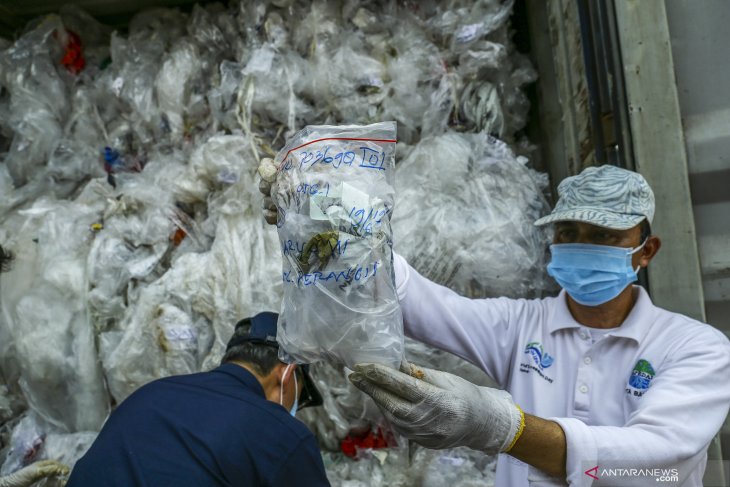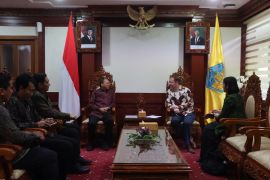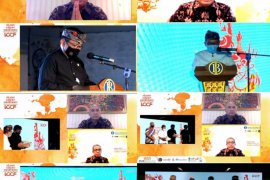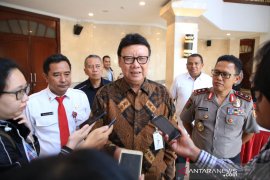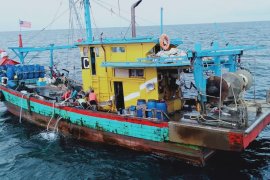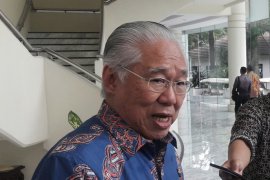The Indonesian authorities who have thoroughly been checking containers full of foreign rubbish arriving at several seaports of the country have been sending the imported waste back to the countries of origin, including the United States and France.
This time, the firm stance was shown by the country's related authorities handling eight containers comprising 210 tons of waste shipped from Brisbane's seaport in Queensland, Australia, to Surabaya's Tanjung Perak Port.
The authorities of Tanjung Perak Port's Customs and Excise Office found that the containers were not just loaded with waste paper but also with a variety of household waste, such as used cans, plastic bottles, used engine oil packaging, and diapers.
The imported waste paper is often used as a raw material for industries. However, as revealed by Head of Tanjung Perak Port's Customs and Excise Office, Basuki Suryanto, on Tuesday, the rubbish found in the eight containers might have contained B3 materials.
"This has been followed up with a physical examination by those from the Customs and Excise Office's law enforcement unit," he said.
Referring to this finding, the Environment and Forestry Ministry has recommended that this imported waste from Australia be shipped back to the country.
"Based on the ministry's recommendation, we give the importer 90 days to send these eight containers of waste paper and other domestic rubbish back to Australia," Suryanto said, adding that this was the second finding in Surabaya.
The first finding was recorded in early June in which waste from the United States of America evidently contained B3 materials. As a result, it was shipped back to its country of origin.
"The authorities imposing sanctions on importers belong to the Environment and Forestry Ministry," he said.
Many municipalities and waste companies in developed countries, including Australia and the USA, have been struggling to find alternatives after China refused to be a dumping ground for foreign rubbish by banning imported waste since early 2018.
Cheryl Katz revealed in her article published in the Yale Environment 360 (2019) that "over the coming decades, as many as 111 million tons of plastic will have to find a new place to be processed or otherwise disposed of as a result of China's ban".
Indonesia and several other countries in Southeast Asia have been chosen by those in developed countries to be their alternative destinations for their waste.
Thus, imported waste has become a serious global challenge. Considering the importance of this issue, environmentalists had even raised the issue of imported plastic waste on the sidelines of the 34th ASEAN Summit in Bangkok, Thailand.
Greenpeace, for instance, launched a petition, titled "No Space for Waste", by urging the ASEAN leaders to "end plastic waste crisis".
As published on its official website, this global environment watchdog appealed to all ASEAN member states to "declare an immediate ban on all imports of plastic waste and e-waste, even those meant for recycling, and ensure all ASEAN countries ratify the Basel Ban Amendment".
Instead of specifically responding to the issue of imported plastic waste, the ASEAN leaders adopted the Bangkok Declaration on Combating Marine Debris in the ASEAN region on June 22.
Apart from the absence of the ASEAN leaders' specific responses on imported waste at their recent summit in Bangkok, Indonesia has shown its firm stance on banning foreign waste.
Indonesia's firm stance is not merely represented by the authorities in Surabaya but it is also shown by the Batam city government, which has recently banned imported plastic waste from being used as raw materials for industries in the coastal city.
The firm stance on banning imported plastic waste was taken by strictly implementing waste management regulations for environmental protection, Head of the Batam City Government's Environmental Management Division IP said.
Related news: Batam city government bans use of imported plastic waste
"We reject those offering imported raw materials," IP affirmed, adding that the Indonesian Customs and Excise officers had recently come across 65 containers of imported plastic waste. Drums, pipes, and buckets were among the plastic goods found loaded inside the containers, which were sent to Batuampar Port.
The importers of plastic waste contended that the containers were filled with raw materials for industries operating in Batam, he remarked.
Indonesia's message is clear: It does not want to become the dumping ground for foreign rubbish, particularly waste containing B3 materials, which will threaten its environment and the lives of its people.
Related news: Indonesian minister draws attention to dangers of plastic waste
Related news: ASEAN Summit good opportunity to put brakes on plastic waste imports
EDITED BY INE


